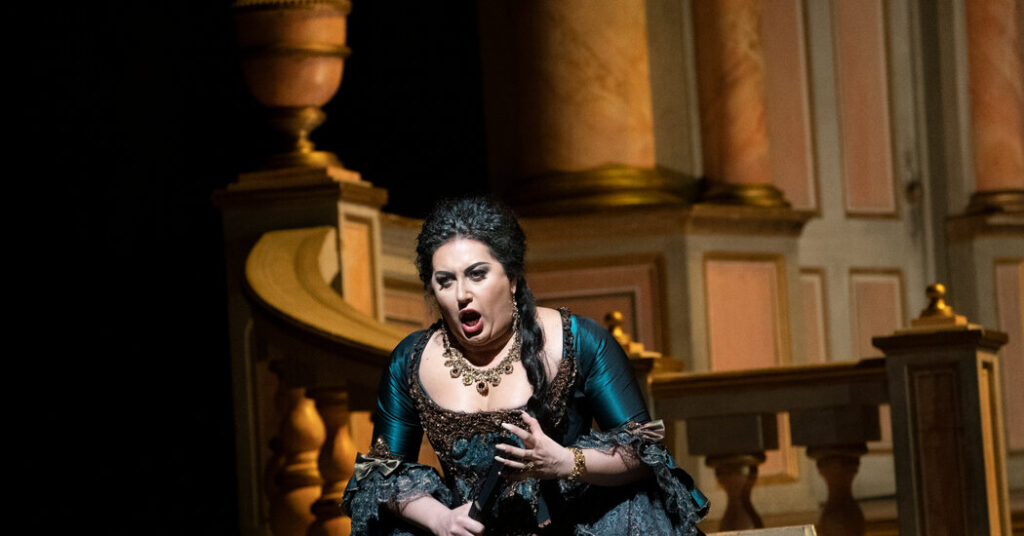The Georgian mezzo-soprano Anita Rachvelishvili was once one of opera’s most sought-after stars, renowned for stirring, powerful performances in works like Bizet’s “Carmen” and Verdi’s “Il Trovatore.”
But after she began experiencing vocal problems during pregnancy in 2021, her career suffered. When she returned to the stage of the Metropolitan Opera, company officials later said, she did not sing up to her standard. The Met canceled her upcoming engagements, and she lost work at other opera companies.
Now Rachvelishvili, 40, is suing both the Met and the union representing her, seeking more than $400,000 in compensation for lost work. In a complaint filed in late March, she accused the Met of breaching its contracts with her, and she said that her union, the American Guild of Musical Artists, had failed to properly represent her.
Rachvelishvili’s lawsuit claimed that the Met had been aware that she had “suffered complications from her pregnancy and birth affecting her voice and vocal range.” The suit described her as being “disabled due to her pregnancy” and accused the opera company of discriminating against her.
“I was shocked that I was not given a chance to recover and all of my contracts for the next two years were immediately canceled without pay,” she said in a statement.
The Met said it could not comment on pending litigation.
Her complaint argues that the Met should compensate her because of a contractual agreement known as “pay or play,” which requires institutions to pay contracted performers even if they later decide not to engage them.
But under the collective bargaining agreement, the Met retains some ability to avoid paying singers who do not meet its artistic standards. According to the agreement, the Met does not have to compensate singers it deems are “vocally or physically unfit for performance.”
Her lawsuit accuses her union, the American Guild of Musical Artists, which represents opera singers, of failing “to file a grievance and proceed to arbitration relating to discrimination based upon plaintiff’s pregnancy or other applicable law.”
The union declined to comment.
The case is notable in part because Rachvelishvili’s lawyer, Leonard D. Egert, used to lead the union she is suing. Egert served as national executive director of the guild from 2016 to 2022. (More recently, he had served as general counsel and general manager of San Francisco Ballet and as a consultant to the Philharmonia Baroque Orchestra & Chorale in San Francisco, whose singers last year voted to unionize.)
Egert said in an interview that his former union should have done more to push the Met to compensate Rachvelishvili for the canceled engagements.
“It would be logical for them to do so,” he said in an interview. “But they did not.”
Rachvelishvili, who made her debut at the Met in 2011, was renowned for the power of her voice. The Met’s general manager, Peter Gelb, once hailed her as the “greatest dramatic mezzo-soprano singing,” and Riccardo Muti, the eminent conductor, had called her “without doubt the best Verdi mezzo-soprano today on the planet.”
But her voice began to suffer during her pregnancy in 2021, becoming “scratchy and strange,” as she recalled in a 2023 interview with The New York Times in which she spoke frankly about her vocal troubles and her efforts to overcome them. She canceled a run of Verdi’s “Don Carlo” at the Met in fall 2022, but arrived there to sing the part of Amneris in “Aida” that December.
After the first performance, Gelb removed her from the production. (“It was obvious that she was not the same singer — at least temporarily not the same singer — who had conquered our stage so brilliantly up to that point,” he said later.) Gelb also canceled a solo recital by Rachvelishvili and her participation in a splashy new production of “Carmen” at the Met that would ring in 2024.
Rachvelishvili’s complaint acknowledges that she was “temporarily limited in her very highest vocal range as a result of giving birth.” But it says that she was “at all times ready, willing and able to perform the roles for which she was contracted,” and that she has since made a full recovery.
Her suit said that her union representatives met the representatives of the Met in February 2023 and that the union initially took the position that the Met was in violation of the “pay or play” provision of the contract. It said that the Met initially indicated that it would offer to “buy out” her contracts. But it said that the Met then withdrew the offer.
The suit said that last year, the union informed Rachvelishvili’s representatives that it would “decline to grieve the contractual violations, file for arbitration or otherwise seek a settlement” with the Met.
The union has not explained its decision.
Rachvelishvili has continued to perform, though not as much as before. In November, she starred in a production of Dvorak’s “Rusalka” that opened the season at Teatro San Carlo in Naples, Italy.

